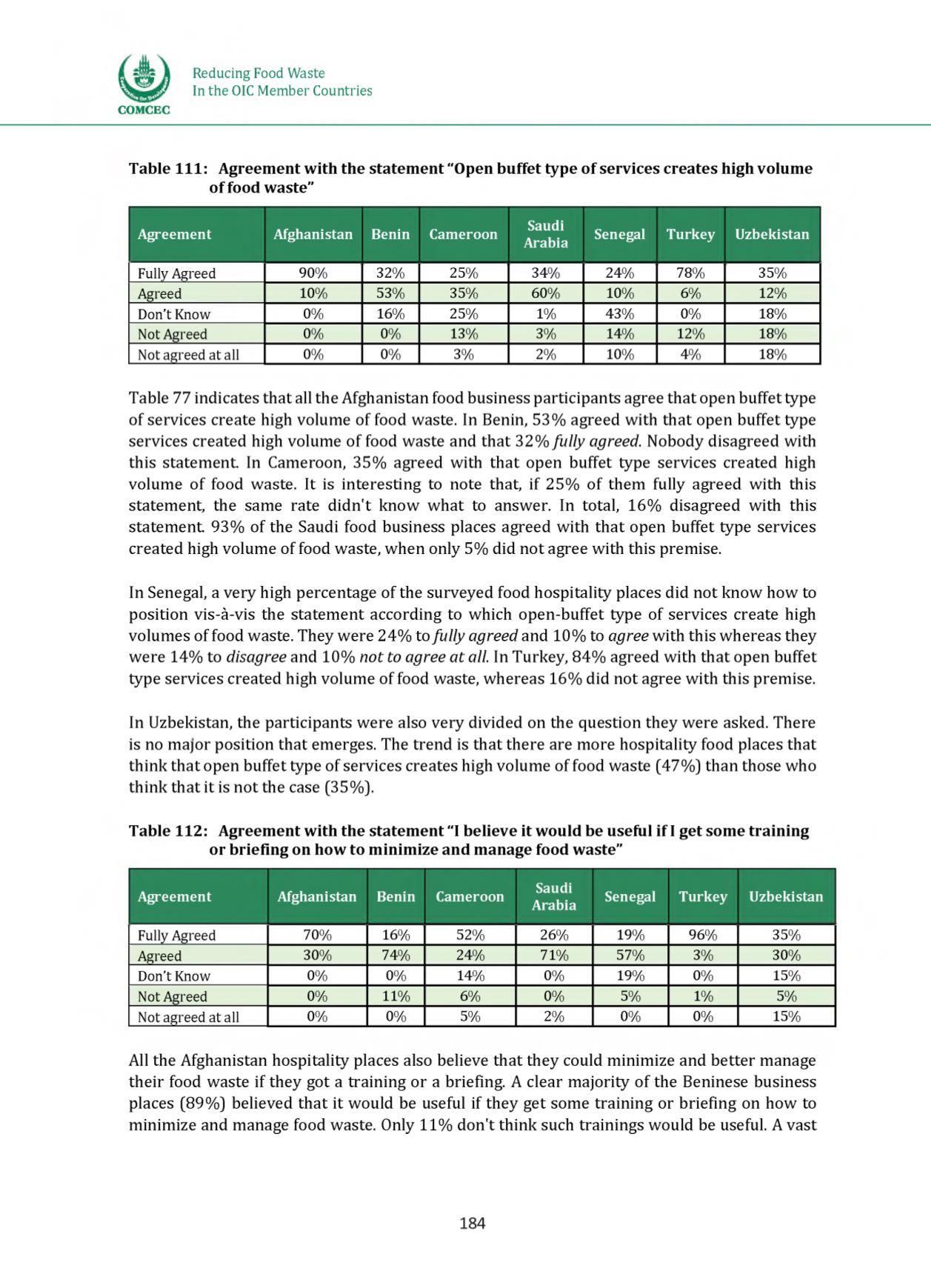

Reducing Food Waste
In the OIC Member Countries
COMCEC
Table 111: Agreement with the statement "Open buffet type of services creates high volume
of food waste”
Agreement
Afghanistan Benin Cameroon Saudi
Arabia Senegal
Turkey Uzbekistan
Fully Agreed
90% 32% 25% 34% 24% 78% 35%
Agreed
10% 53% 35% 60% 10% 6%
12%
Don’t Know
0% 16% 25%
1% 43% 0%
18%
Not Agreed
0%
0% 13%
3% 14% 12% 18%
Not agreed at all
0%
0% 3%
2% 10% 4%
18%
Table 77 indicates tha t all the A fghanistan food business participants agree tha t open buffet type
of services create high volume of food waste. In Benin, 53% agreed w ith tha t open buffet type
services created high volume o f food waste and tha t 32%
fu lly agreed.
Nobody disagreed w ith
this statement. In Cameroon, 35% agreed w ith tha t open buffet type services created high
volum e o f food waste. It is interesting to note that, if 25% o f them fully agreed w ith this
statement, the same rate d id n 't know w h a t to answer. In total, 16% disagreed w ith this
statement. 93% of the Saudi food business places agreed w ith th a t open buffet type services
created high volum e of food waste, w hen only 5% did n o t agree w ith this premise.
In Senegal, a very high percentage of the surveyed food hospitality places d id no t know how to
position vis-à-vis the statement according to which open-buffet type of services create high
volumes of food waste. They were 24% to
fu lly agreed
and 10% to
a g ree
w ith this whereas they
were 14% to
disagree
and 10%
n o t to a gree a t all.
In Turkey, 84% agreed w ith tha t open buffet
type services created high volum e of food waste, whereas 16% d id no t agree w ith this premise.
In Uzbekistan, the participants were also very divided on the question they were asked. There
is no m ajo r position tha t emerges. The trend is tha t there are more hospitality food places that
th in k th a t open buffet type of services creates high volum e of food waste (47% ) than those who
th in k tha t it is n o t the case (35% ).
Table 112: Agreement with the statement "I believe it would be useful if I get some training
or briefing on how to minimize and manage food waste”
Agreement
Afghanistan Benin Cameroon Saudi
Arabia Senegal
Turkey Uzbekistan
Fully Agreed
70% 16% 52%
26% 19% 96%
35%
Agreed
30% 74% 24%
71% 57% 3%
30%
Don’t Know
0%
0% 14%
0% 19% 0%
15%
Not Agreed
0%
11% 6%
0%
5% 1%
5%
Not agreed at all
0%
0%
5%
2%
0% 0%
15%
All the Afghanistan hospitality places also believe tha t they could m in im ize and better manage
their food waste if they got a tra in ing or a briefing. A clear majority o f the Beninese business
places (89% ) believed th a t it w ou ld be useful if they get some tra in ing or briefing on how to
m in im ize and manage food waste. Only 11% don 't th ink such trainings w ou ld be useful. A vast
184
















